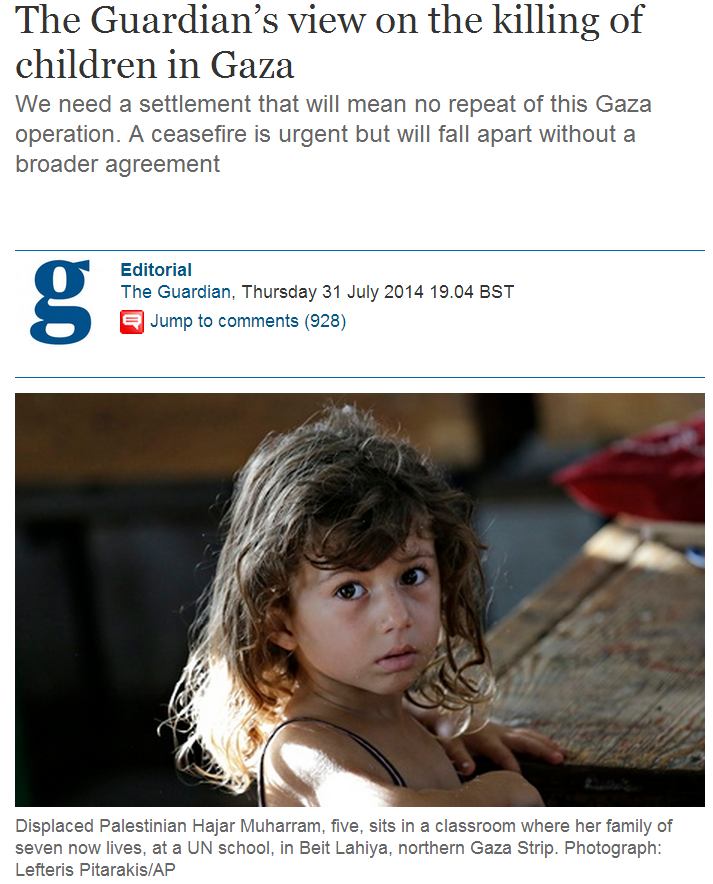The Guardian editorial team recently decided that readers needed to hear their sage reflections on the killing of children during wartime – no, of course, not just any war, but one fought by a political actor which (based on their documented history of obsessive, some would say ‘disproportionate, criticism) is especially in need of moral advice on the sanctity of childhood.

Here are the opening paragraphs of the July 31st Guardian editorial, with the most important sentences emphasized in bold.
Wars kill people, including teachers in their classrooms, nurses in their hospitals, and farmers in their fields. But when children die in the hail of steel soldiers direct at one another there is a special kind of obscenity. Children have no agency, not even the slightest shred of the responsibility or complicity that adults to one degree or another may possess.
They know nothing of propaganda, they did not cheer in angry rallies, they did not send off their menfolk to fight with a blessing, they did not sit at meetings where the pros and cons of making war were gravely discussed by middle- aged men. No, they just die. Or lose their little legs, their arms, their eyes. The scenes at Jabaliya elementary school had seasoned United Nations officials, who have seen and endured much, in tears. The rapid transference of images to the world soon made this tragedy everybody’s property and everybody’s burden. Then, of course, a familiar game begins. Mournful spokesmen explain that the other side is to blame, because it has hidden its fighters, mortars and rockets in populated areas. They take great care, but mistakes can happen. They do not explain why that other side might be reluctant to put its fighters into, say, the local soccer stadium so that they could be mown down without risk to civilians.
If you read that last underlined sentence carefully, it’s difficult to avoid concluding that the Guardian is essentially acknowledging the Hamas use of civilians as human shields, but then asking: ‘however, given the group’s limited alternatives, who can really blame them?‘!
In case the Guardian needs reminding:
- Geneva Convention IV: Article 28 of the 1949 Geneva Convention IV provides: “The presence of a protected person may not be used to render certain points or areas immune from military operations
- Additional Protocol I: Article 12(4) of the 1977 Additional Protocol I provides: Under no circumstances shall medical units be used in an attempt to shield military objectives from attack. Whenever possible, the Parties to the conflict shall ensure that medical units are so sited that attacks against military objectives do not imperil their safety
- Article 51(7) of the 1977 Additional Protocol I provides:
The presence or movements of the civilian population or individual civilians shall not be used to render certain points or areas immune from military operations, in particular in attempts to shield military objectives from attacks or to shield, favour or impede military operations. The Parties to the conflict shall not direct the movement of the civilian population or individual civilians in order to attempt to shield military objectives from attacks or to shield military operations
- ICC Statute: Pursuant to Article 8(2)(b)(xxiii) of the 1998 ICC Statute, “[u]tilizing the presence of a civilian or other protected person to render certain points, areas or military forces immune from military operations” constitutes a war crime in international armed conflicts
Indeed, no doubt much to the chagrin of Guardian editors and their fellow apologists for terror, it seems clear that international legal prohibitions against the use of human shields definitely do not include loopholes for Palestinian ‘resistance’ movements.
Like this:
Like Loading...

Did an official Guardian editorial justify Hamas's use of human shields?
The Guardian editorial team recently decided that readers needed to hear their sage reflections on the killing of children during wartime – no, of course, not just any war, but one fought by a political actor which (based on their documented history of obsessive, some would say ‘disproportionate, criticism) is especially in need of moral advice on the sanctity of childhood.

Here are the opening paragraphs of the July 31st Guardian editorial, with the most important sentences emphasized in bold.
If you read that last underlined sentence carefully, it’s difficult to avoid concluding that the Guardian is essentially acknowledging the Hamas use of civilians as human shields, but then asking: ‘however, given the group’s limited alternatives, who can really blame them?‘!
In case the Guardian needs reminding:
The presence or movements of the civilian population or individual civilians shall not be used to render certain points or areas immune from military operations, in particular in attempts to shield military objectives from attacks or to shield, favour or impede military operations. The Parties to the conflict shall not direct the movement of the civilian population or individual civilians in order to attempt to shield military objectives from attacks or to shield military operations
Indeed, no doubt much to the chagrin of Guardian editors and their fellow apologists for terror, it seems clear that international legal prohibitions against the use of human shields definitely do not include loopholes for Palestinian ‘resistance’ movements.
Related articles
Like this:
Economist tries out new euphemism for malevolent terrorists: “Restive” Palestinians
You may also like
The Guardian jumps the shark – compares nuns to suicide bombers
The dishonesty of Soumaya Ghannoushi and her Guardian enablers
Happy Succot!